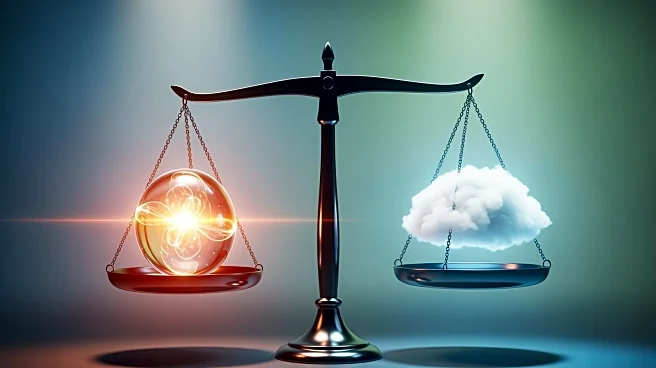What's Happening?
The U.S. Environmental Protection Agency (EPA) has proposed a significant narrowing of the Greenhouse Gas Reporting Program (GHGRP), which would eliminate most reporting requirements except for petroleum
and natural gas operations under Subpart W, delayed until 2034. This proposal, announced on September 12, 2025, is part of a broader deregulation effort under Executive Orders aimed at reducing regulatory burdens. The proposal has attracted over 53,000 comments from various stakeholders, including industry groups, environmental organizations, state officials, and the public. Environmental groups have expressed strong opposition, arguing that the GHGRP is crucial for climate policy, transparency, and federal incentives. They warn that its rollback could hinder climate risk assessment and disproportionately affect vulnerable communities. Industry feedback is mixed, with some acknowledging the program's benefits for emissions management and investor disclosures, while others criticize the EPA's claims of cost savings.
Why It's Important?
The proposed changes to the GHGRP have significant implications for U.S. climate policy and industry practices. The program has been a key tool for tracking greenhouse gas emissions and informing policy decisions. Its reduction could impact federal and state climate programs that rely on GHGRP data, potentially affecting efforts to address climate change. Environmental groups argue that the rollback undermines transparency and data collection necessary for effective pollution control strategies. Industry groups are concerned about the disruption of ongoing projects and investments, suggesting that the costs of rescinding the program may outweigh the benefits. The proposal also raises questions about the EPA's authority under the Clean Air Act, with potential legal challenges expected.
What's Next?
If finalized, the rule would take effect 60 days after publication, but legal challenges are likely given the significant public concern. Recent court rulings have emphasized the need for independent interpretation of the EPA's authority under the Clean Air Act, which could influence the outcome. The proposal's impact on federal and state climate programs and industry practices will be closely watched, with stakeholders potentially seeking alternative approaches to emissions management and reporting.
Beyond the Headlines
The proposed rollback of the GHGRP highlights broader debates about regulatory approaches to climate change and the balance between economic growth and environmental protection. The move reflects ongoing tensions between deregulation efforts and the need for comprehensive climate data to inform policy decisions. The outcome of this proposal could set precedents for future regulatory actions and influence the direction of U.S. climate policy.









